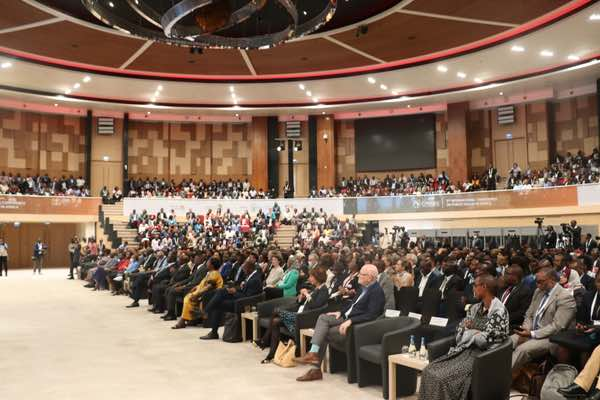
The African Constituency Bureau (ACB) in collaboration with the Ministry of Health organized on December 14 a panel discussion on the margins of the second Conference on Public Health in Africa. The side event (CPHIA) titled “Policy Dialogue on Advancing Local Manufacturing for Health Commodities in Africa.”
Panel members included Dr. Charles Mwasambo, an alternate Board member of East and Central Africa to the Global Fund Board, Dr. Foluke Olusegun, Mr. Chris Alando, Dr. Ebere Okereke, Dr. Gerald Macharia, Mrs. Celsa Gaju, and Dr. Stephen Karengera. The meeting sought to advance the local manufacturing policy discourse informed by Africa’s dependence on imports that account for over 70% and are worth around $14 billion annually.
Africa imports about 95% of its medicines and all the panelists agreed that this level of dependence is dangerous in terms of health security. As a panelist Dr. Gerald Macharia, Director of EAC Regional Centre of Excellence for Vaccines, Immunization and Health Supply Chain Management said: “Africa is the only demand that has no control over its own supply.”
All panelists agreed on the need to produce locally a higher share of medicines, vaccines and other health commodities consumed in Africa. But locally does not mean in each country; on the contrary, it means at the continental level.
Such an objective requires among others harmonization of regulatory policies across the continent to aggregate demand, in other words, to create a large continental market instead of the many small size markets at the scale of individual countries. It also requires prioritizing some important health commodities, instead of trying to produce all that Africans need.
African Governments and continental bodies like African Union or African CDC” should lead and coordinate this discussion, then act in a coordinated approach. They also highlighted the need for greater involvement of the private sector, continental demand aggregation, leadership from government, policy coherence between health, trade, finance, and other critical sectors, enabling ecosystem that includes favorable tax regimes, investment in research and development, capacity building, the inclusion of youth in the policy discourse among others.
The panelists highlighted the necessity to involve the private sector in the conversation. During a Q&A session at the end, a participant stressed the competitiveness of African manufacturers and their readiness to produce, another insisted on the importance of involving young people in the discussion; another yet suggested that African governments use their Global Fund co-financing to invest in Research and Development.
This side event was a useful preliminary discussion on the topic of local manufacturing in Africa. As a follow up, ACB is will host a meeting that will gather experts on market shaping / local manufacturing in 2023. The meeting will discuss a draft position statement for Africa and its implications for NextGen Market Shaping and provide a roadmap for advocacy and political engagement. (End)
